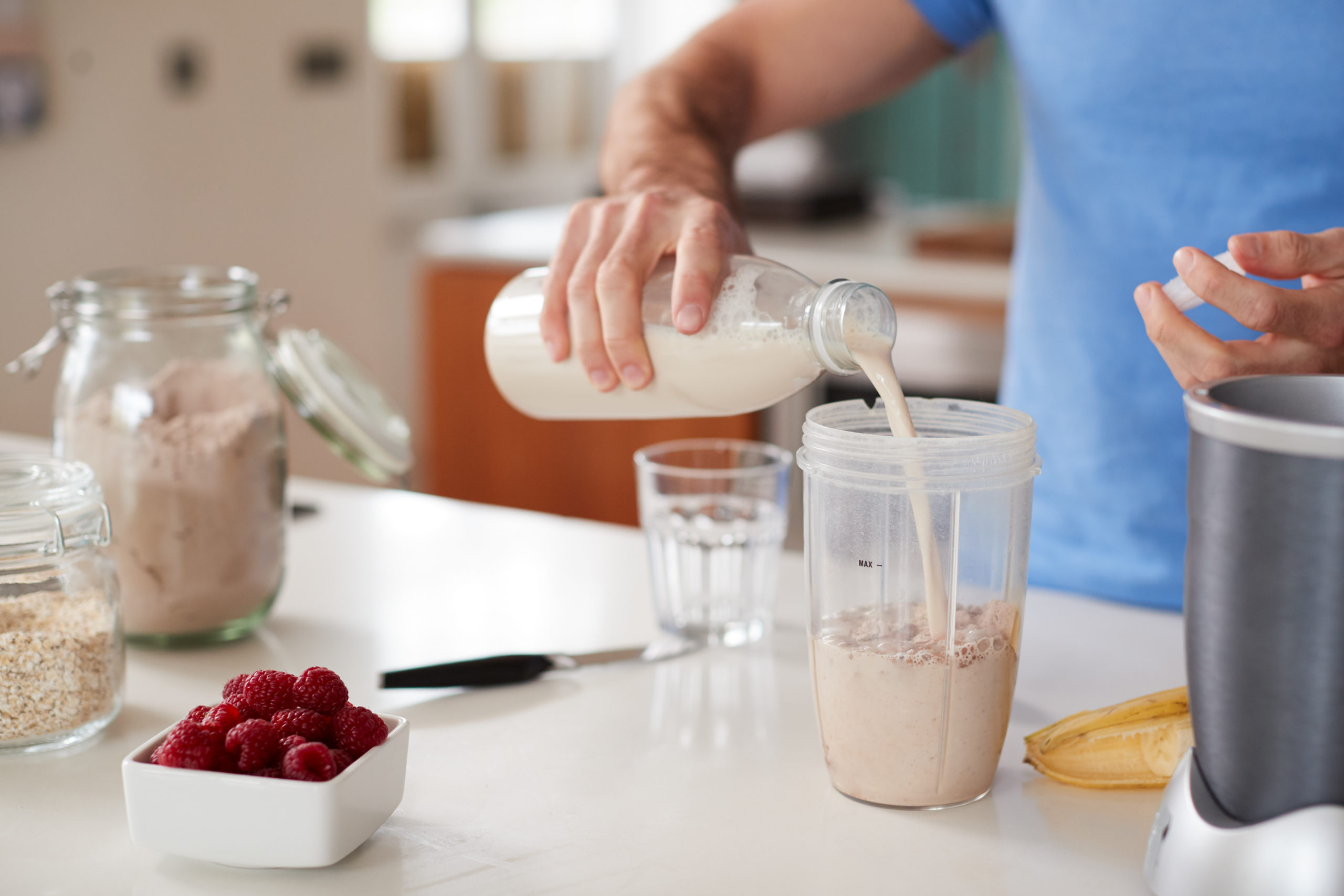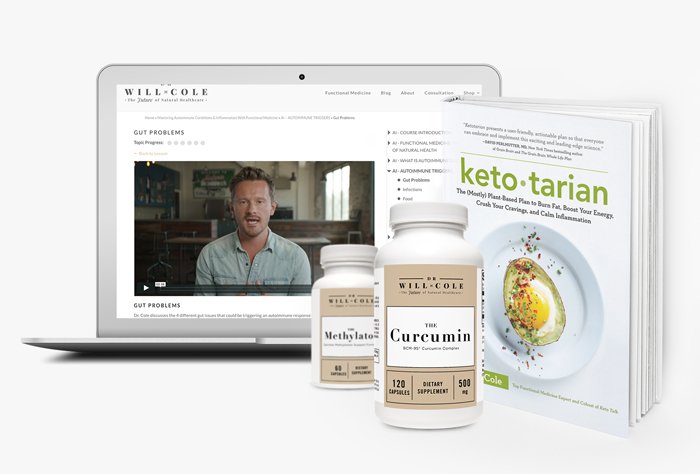Could Your Protein Powder Be Throwing Off Your Hormones?

Protein powder can be a great way to bulk up the nutritional value of certain foods. For those on the go they can be added to smoothies to create a filling breakfast or added to baked goods. However, in my functional medicine clinic I often find my patients dealing with some unpleasant side effects not limited to acne, digestive problems, rashes, and even menstrual irregularity. With so many different protein powders on the market how are you supposed to know which option has the most nutritional value with the least amount of side effects? Well, let’s take a deeper look into each type on the market and exactly how they can potentially impact your hormones.
Article continues below
Collagen
Our skin, tendons, bones, ligaments, cartilage, and more are all made up of collagen. Adequate intake is necessary to produce our own collagen as well as maintain healthy metabolism. Collagen is made up of three amino acids, hydroxyproline, glycine, and proline. Although your body produces each of these amino acids it is not in amounts that are useful. Therefore it is necessary to make sure you are getting these in through diet or supplementation. An average diet contains around three grams of glycine but 15 is optimal. Collagen comes in many different varieties all containing different collagen subtypes.
- Bovine collagen: Found in cows, this collagen contains Type I and Type III subtypes. It is one of my favorite varieties in terms of compatibility with our own body due to the fact that the Type I subtype is most commonly found in the human body. Type I makes up tendons, bones, and ligaments and Type III is in bone marrow, cartilage, and connective tissue. Make sure to look for grass-fed to really reap the most nutritional benefits.
- Chicken collagen: This is made up of Type II collagen which is in chicken cartilage and bones.
- Fish collagen: This is one of my all-time favorites! It contains Type I collagen and is the most bioavailable option due to the smaller particles of collagen peptides.
- Eggshell membrane collagen: This is made up of Type I and Type V collagen which work synergistically to improve the health (1) of connective and joint tissues. It is also a great option if you are looking for muscle growth.
Hormone conclusion:
Collagen has minimal effect on hormones since it contains subtypes that are found in our bodies. Most people tolerate it well and it is extremely bioavailable.
Casein
This is the protein found in cow’s milk. It is popular in protein powders because it takes longer to digest and gives your body more time to use it. (2) Therefore it is great if you are using it pre-workout to help build new muscle tissue.
Hormone conclusion:
It really depends on what type of casein you are getting. Casein can be found in either the A1 or A2 subtype. A1 is the most common form in almost all dairy products in America. Due to all of the crossbreeding that has been done in the United States, most cows have casein gene mutations. Those with dairy intolerance issues can have A1 casein to blame. Studies have linked A1 casein with digestive problems and inflammation, which throws off your hormones. If you want to use a casein based protein powder you’ll want to look for one containing the ancient beta A2 casein which is easier to digest and has a higher vitamin content.
Egg White
Egg white protein is used as the standard to judge the bioavailability of other protein sources and contains all of the body’s essential amino acids.
Hormone conclusion:
Some people can’t tolerate the albumin found in egg whites which can lead to increased inflammation. But if eggs are not a problem for you, it is one of the best options because of its high bioavailability.
Whey
This is what is left when milk is curdled and strained in the process of making cheese. It contains all essential amino acids with high levels of leucine which is needed for protein synthesis. (3)
Hormone conclusion:
Since it is dairy-based whey still contains casein. It can continue to perpetuate inflammation in those sensitive to dairy and in turn mess up hormones. If you can tolerate dairy make sure to purchase grass-fed whey which is less processed and more nutrient-dense.
Soy
We can’t talk about protein sources without mentioning the ever-controversial soy. Soybeans are first defatted and de-hulled and processed into three forms – soy isolates, soy flour, and soy concentrates.
Hormone conclusion:
Soy is considered a phytoestrogen. These are plant-based estrogens that your body does not produce through the endocrine system. Instead, they are gained through eating phytoestrogen classified plants. Out of all phytoestrogens, soy is the most well-known and can affect your hormones in a big way. Men and women who have issues with estrogen dominance don’t always handle soy well. If you are buying soy, make sure to purchase non-GMO varieties to help mitigate these problems.
Hemp
This is the least bioavailable and has the lowest amount of protein compared to other plant-based options with only 30-50% protein by weight versus 90-100% in other choices. However, it does contain loads of fiber and omega fat which are both needed for gut and brain health.
Hormone conclusion:
Even though its protein content is minimal it does contain tons of fiber, iron, vitamin E, and essential fatty acids. Since your body can’t produce these on its own this can be a great option with very little, if any, hormonal side effects.
Rice
It is considered a complete protein source because it contains all nine essential amino acids. And while it contains less lysine than whey protein its bioavailability is almost as much (4) as beef!
Hormone conclusion:
As long as you can tolerate grains, rice can be a great option. Grains can be inflammatory for some people which can lead to imbalanced hormones and skin problems like acne.
Pea
This protein powder comes from yellow split peas. It is contains all nine essential amino acids, however some are in low amounts and for that reason is not considered a complete protein. In order to reap the benefits it may need to be paired with a complementary protein like rice. It can help you stay full longer so it can be the perfect addition to your morning smoothie.
Hormone conclusion:
As long as you can handle legumes and grains, this is a great plant-based option. However, if you can’t tolerate legumes they can potentially cause digestive problems and hormone imbalance. If you notice stomach problems after eating legumes it is a good sign that you need to avoid pea protein.
Sacha inchi
This seed from Peru is also known as the Inca peanut. It has 9 grams of protein per serving and is considered a complete protein since it contains all essential amino acids.
Hormone conclusion:
This is one of my favorite plant-based protein sources for those who want to avoid grains. Although it is not as bioavailable as collagen it is high in omega fat which helps keep hormones healthy.
Pumpkin Seed
Calling all pumpkin lovers, you can now take your obsession to a whole new level with the addition of pumpkin seed protein powder. What it lacks in that yummy PSL flavor it makes up for with its nutritional value. It contains 12 grams of protein per cup and is considered a complete plant protein due to its amino acid content.
Hormone conclusion:
The fat content of pumpkin seed protein, at 12 grams per cup, is second to none. Since healthy fats are needed for balanced hormones, long-lasting energy, and a healthy brain, this is a great option to help boost your daily fat intake. But if you can’t tolerate seeds, avoid this option.
If you are having problems with your protein powder, it isn’t always the protein source that’s the problem. It’s important to always read the label of whatever you’re buying since the problem can often stem from added ingredients. Make sure to always go for organic with the fewest added ingredients in order to avoid sugars and other fillers.
And although I love protein powder as an occasional addition to smoothies or other recipes, I always advocate that real, whole food be your main protein source.
As one of the first functional medicine telehealth clinics in the world, we provide webcam health consultations for people around the globe.
Photo: Envato Elements
Start Your Health Journey Today
FUNCTIONAL MEDICINE CONSULTATIONS FOR PEOPLE AROUND THE WORLD
References:
- Boyce RW, Franks AF, Jankowsky ML, et al. Sequential histomorphometric changes in cancellous bone from ovariohysterectomized dogs. J Bone Miner Res. 1990;5(9):947-953. doi:10.1002/jbmr.5650050908
- Stark M, Lukaszuk J, Prawitz A, Salacinski A. Protein timing and its effects on muscular hypertrophy and strength in individuals engaged in weight-training. J Int Soc Sports Nutr. 2012;9(1):54. Published 2012 Dec 14. doi:10.1186/1550-2783-9-54
- Fujita S, Dreyer HC, Drummond MJ, et al. Nutrient signalling in the regulation of human muscle protein synthesis. J Physiol. 2007;582(Pt 2):813-823. doi:10.1113/jphysiol.2007.134593
- V.W. Padhye and D.K. Salunkhe Extraction and Characterization of Rice Proteins Utah State University 1979. https://www.cerealsgrains.org/publications/cc/backissues/1979/Documents/chem56_389.pdf
Shop This Article
Purchase personally curated supplements
and Dr. Will Cole’s books!

The information on this website has not been evaluated by the Food & Drug Administration or any other medical body. We do not aim to diagnose, treat, cure or prevent any illness or disease. Information is shared for educational purposes only. You must consult your doctor before acting on any content on this website, especially if you are pregnant, nursing, taking medication, or have a medical condition.
Our articles may include products that have been independently chosen and recommended by Dr. Will Cole and our editors. If you purchase something mentioned in this article, we may earn a small commission.

BY DR. WILL COLE
Dr. Will Cole, DNM, IFMCP, DC is a leading functional medicine expert who consults people around the globe, starting one of the first functional medicine telehealth centers in the world. Named one of the top 50 functional and integrative doctors in the nation, Dr. Will Cole provides a functional medicine approach for thyroid issues, autoimmune conditions, hormonal imbalances, digestive disorders, and brain problems. He is also the host of the popular The Art of Being Well podcast and the New York Times bestselling author of Intuitive Fasting, Ketotarian, Gut Feelings, and The Inflammation Spectrum.

Gut Feelings
Healing The Shame-Fueled Relationship
Between What You Eat And How You Feel


